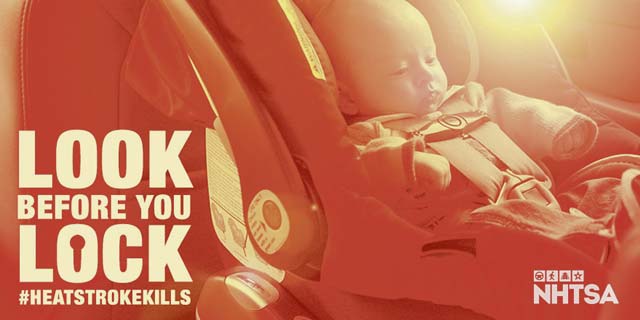
Child death from vehicular heatstroke is a parent’s worst nightmare, but unfortunately, it happens more often than you think.
Heatstroke is one of the leading causes of death among children. Regrettably, even great parents may forget a child in the back seat when distracted. Caregivers who aren’t used to driving kids or those whose routine suddenly changes may also overlook a sleeping child in the backseat. While all untimely accidents and injuries are unfortunate, they can be prevented by increasing awareness and educating people about preventative behaviors.
Use these tips to avoid putting children at risk of heatstroke:
- Always check the back seats of your vehicle before you lock it and walk away.
- Keep a stuffed animal or other memento in your child’s car seat when it’s empty, and move it to the front seat as a visual reminder when your child is in the back seat.
- If someone else is driving your child or your daily routine has been altered, always check to make sure your child arrived safely.
- Keep in mind a child’s sensitivity to heat.
- In 10 minutes, a car’s temperature can rise more than 20 degrees Fahrenheit.
- Even with an outside temperature of 60 degrees, the temperature inside your car can reach 110 degrees.
- A child may die when his or her body temperature reaches 107 degrees.
Understand the potential consequences of kids in hot cars:
- Severe injury or death
- Being arrested and jailed for child endangerment
- A lifetime of regret
You can help prevent these tragedies from occurring. If you see a child alone in a car, first determine if the child is in immediate distress and notify law enforcement professionals by dialing 112. A child’s safety is paramount — so above all else — action should be taken to safeguard the child’s life prior to the arrival of first responders, if necessary. So, if a child in a vehicle seems hot or sick, get him or her out of the vehicle as quickly as possible.
The effects of extreme heat are not only harmful to infants and young children, but to pets as well. Never leave your pets in a parked car, even if the windows are open, because they can suffer from heat-related illness too.
So whether you’re the parent of a baby or a fur baby, never forget your kid in the backseat — and always remember to look before you lock!







